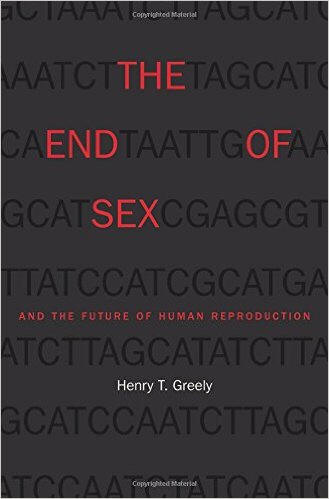Book Review
The End Of Sex and The Future Of Human Reproduction
Henry T.Greely
Harvard University Press (27 May 2016)
ISBN:
978-0674728967
 This
book proved to be an interesting and thought provoking read even though I
found myself disagreeing with much of it. How will advances in
reproduction change humanity? How soon can couples have children born
without genetic diseases? Can couples in future plan their children
according to certain mental and physical characteristics? Welcome to the
Brave New World: this book captures some of the ethical, legal and
scientific challenges ahead.
This
book proved to be an interesting and thought provoking read even though I
found myself disagreeing with much of it. How will advances in
reproduction change humanity? How soon can couples have children born
without genetic diseases? Can couples in future plan their children
according to certain mental and physical characteristics? Welcome to the
Brave New World: this book captures some of the ethical, legal and
scientific challenges ahead.
Greely predicts a future when children are conceived in clinics. Fertility experts will be able to create male and female gametes from skin. Embryos will be screened and parents will be able to select the children of their choice. Not only will the children be free of genetic diseases but their sex, hair colour and other characteristics will be selected. And the process will be much cheaper than that involving IVF: Greely calls it "Easy PGD". If only the ethics and the consequences to humanity were that easy.
Gay and lesbian couples will be able to have their own genetic children. Sperm will be made from women and eggs from men. Although Greely argues that religion should not be used to justify a complete ban, I thought his comments on the teachings of the Catholic Church are fair and balanced. And, amazingly enough, he quotes from Humanae Vitae! If only more of us Catholics have the insight that Greely obviously has: once we reject the teachings of Humanae Vitae, we open a veritable Pandora's Box of possibilities.
There are so many questions that need asking: Will parents have sufficient information to make reasonable choices.? Will the future provide parents with just too many choices? What if deaf parents, for example, have a preference for a deaf child? Greely responds with a utilitarian view: advances in reproductive technology must bring about the greatest overall benefits and the least amount of harm. Relatively little is said about the ethics of the procedures themselves. Elsewhere, he has said that "Parents will be told: these five (human embryos) have really serious diseases, you don't want them." And there lies yet another problem: parents who refuse these options will be made to feel like bad parents who bring diseased children into the world. What kind of care will be provided for these disabled persons?
Greely has carried out a cost-efficient analysis to show how much can be saved by getting rid of genetic diseases. Will becoming pregnant by sexual intercourse be considered irresponsible?
There may be a time when eggs and sperm will be from the same person, when chromosomes are made by chemistry and IVF between siblings or pensioners. Sex for reasons of procreation will disappear and Greely believes that this will happen in the next few decades. The man provides the sperm and the woman the skin.
Greely does a great job in explaining the science behind all these technologies. Thankfully, even at the scientific level, choosing certain characteristics like intelligence will prove difficult.
Greely has a chapter on eugenics, a chapter of the utmost importance and the reason why, in my opinion, these future predictions are to be feared. The more I read, the more convinced I became that the Catholic Church has got it right.Overall, a useful book to read by those on different sides of the debate.
Reviewed by Dr Pravin Thevathasan
